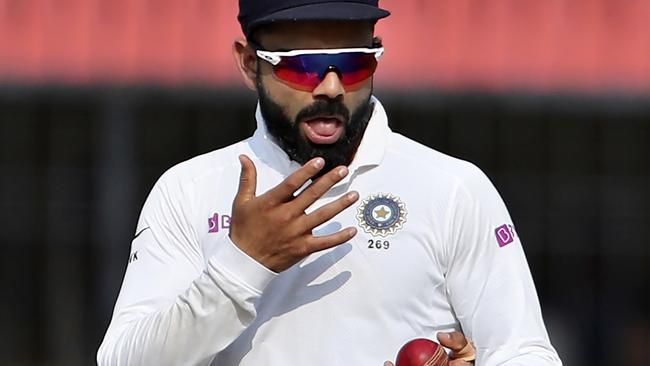Spit rule will take shine off cricket
The move to protect players’ health by banning the use of saliva on the cricket ball threatens the very health of the game.

The move to protect players’ health by banning the use of saliva on the cricket ball is understandable in these times, but to remove this trick from the struggling seam bowlers’ repertoire without offering a replacement strategy threatens the very health of the game.
And nowhere is the danger more apparent than Australia.
In England, the weather, the pitches and the ball provide all the assistance necessary. In New Zealand, pitch, until recently, and climate are kind to quicks. Halfway between it spits and spins out of the cracks and dust, but in these parts the pitches offer little, the ball often less and the skies are unhelpful and unusually cruel to the men coming off the long run.
The ICC has recommended the use of saliva to shine the cricket ball be outlawed, but ignored suggestions the bowler be allowed other means to seek swing.
Kookaburra had proposed a wax, Ian Chappell had suggested a natural means of degradation like those currently outlawed. A thumbnail say. Shane Warne believes an inherent bias like the one in a lawn bowl might work.
The ICC issued a statement on Tuesday after receiving medical advice about the use of saliva.
“The ICC Cricket Committee heard from the Chair of the ICC Medical Advisory Committee Dr Peter Harcourt regarding the elevated risk of the transmission of the virus through saliva, and unanimously agreed to recommend that the use of saliva to polish the ball be prohibited,” it said in a statement.
“The committee also noted the medical advice that it is highly unlikely that the virus can be transmitted through sweat and saw no need to prohibit the use of sweat to polish the ball whilst recommending that enhanced hygiene measures are implemented on and around the playing field.”
Balls need to be loved and mistreated in equal measure to really get that magic in the air. One side with a spit and shine, the other desiccated and decayed.
Polishing and scratching balls has been one of the more controversial areas of the modern game. Faf du Plessis’ rolling mintgate soap opera on these shores in 2016 was a warm-up act for the sandpaper scandal that followed in his country two years later.
In Australia, if the bowlers are lucky, the ball swings early and reverses late, but only if they are lucky and attentive. Before the incident in South Africa every side had a designated ball manager because reverse swing was such a potent measure and so difficult to attain. Since then, sides have been more circumspect.
One thing you can almost be sure of here is that if the ball doesn’t swing, the advantage swings heavily in favour of batsmen. The result will be longer innings, longer games and none of that excitement when batsmen are baffled, unsure if the ball will go this way or that. Bats are now bigger, arms stronger and boundaries closer but balls remain the same and bowlers’ backs remain as brittle as ever.
The best cricket happens when the ball moves in the air or off the pitch. It becomes a test of survival for the batsman, not a test of the spectators’ patience. Mitchell Johnson told The Australian on Tuesday that he was willing to accept the medical advice but believes something has to be done to stop the game becoming even more favourable to the runscorers.
“The ball needs to swing to make the game exciting,” the veteran of 73 Tests said. “Otherwise you may as well wheel a bowling machine out there and watch batsmen have a hit.
“Bowlers will suck it up, they’ll adapt and probably try and bowl off cutters and leg cutters but the game is so much more exciting if the ball swings.”
Johnson had the angle and bounce that did damage without swing, but says that when it did, he really felt that he was in the game and could “set the batsman up”.
He said they’d have to look at pitches, but as all bowlers know, there’s been talk of making them more challenging for 20 years and the only place it has happened is when they need to protect the pink ball which swings anyway.
Merv Hughes wonders why the ban.
“If they are worrying about saliva they shouldn’t play,” he said.
“If they are worrying about it spreading they shouldn’t play. All the players will have tests to make sure they’re cleared and they’ll be monitored more closely than most. It just seems over the top.”
David Warner said players will be so close that if there is a virus in the group it will be shared anyway.
“You’re sharing changerooms and everything else, I don’t see why you have to change that,” Warner told cricket.com.au.
“It’s been going around for hundreds of years, I can’t recall anyone that’s got sick by doing that. If you’re going to contract a bug, I don’t think it’d necessarily be just from that.”
The committee also recommended the use of local umpires where it became impossible to fly in neutral officials and the addition of an extra DRS review.




